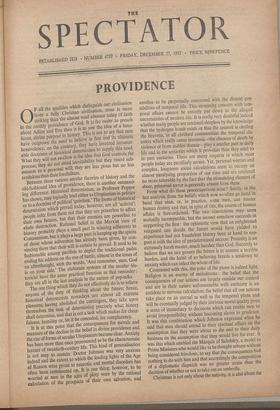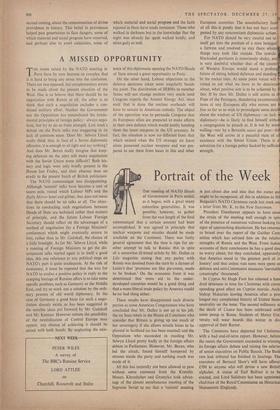PROVIDENCE
0 F all the qualities which distinguish our civilisation from a fully Christian civilisation, none is more striking than the almost total absence today of faith in the earthly providence of God. It is far "easierto preach about Adam and Eve than it is to sow the idea of a bene- ficent, divine purpose in history. This is not to say that men have outgrown the need to believe in fate and its ultimate benevolence; on the contrary, they have invented innumer- able doctrines of historical determinism to supply this need. What they will not swallow is the idea that God controls the process; they do not mind inevitability but they resent sub- mission to a personal will; they are less pious but no less credulous than their forefathers.
Between these various secular theories of history and the old-fashioned idea of providence, there is another outstand- ing difference. Historical determinism, as Professor Popper has shown, may logically lead either to Utopianism in politics or to a doctrine of political 'quietism.' The forms of historical determinism which prevail today, however, are all `activist'; people infer from them not that they are powerless to affect their own futures, but that their enemies are powerless to elude destruction. Rational belief in the Marxist view of history probably plays a small part in winning adherents to Communism, but it plays a large part in keeping up the spirits of those whose adherence has already been given, by con- vincing them that their will is certain to prevail. It used to be fashionable among pacifists to depict the traditional padre ending his address on the eve of battle, almost in the tones of an afterthought, with the words, And remember, men, God is on your side.' The elaborate systems of the secular his- toricist have the same practical function as that reminder : they are all in the last analysis in the nature of pep-talks.
The one thing which they do not effectively do is to relieve anyone of the duty of thinking about the future; hence, historical determinists nowadays are almost all extreme planners; having abolished the contingent, they take upon themselves the task of determining precisely what history shall determine, and that is not a task which makes for cheer- fulness, humility or, let it be conceded, for complacency. It is at this point that the consequences for morals and manners of the decline in the belief in divine providence and the rise of forms of secular Utopianism become clear. Anxiety has been more than once pronounced to be the characteristic feature of twentieth-century life. This kind of generalisation is not easy to sustain. Doctor Johnson was very anxious indeed and the extent to which the leading lights of the Age of Reason were prone to neurotic and mental disorders has often been commented on. It is one thing, however, to be worried as men in the ages of piety were by the rational calculation of the prospects of their own salvation, and another to be perpetually concerned with the distant pos- sibilities of temporal life. This mounting concern with tem- poral affairs cannot be entirely put clown to the alleged uncertainties of modern life. It is really very doubtful indeed whether many people are rendered sleepless by the knowledge that the hydrogen bomb exists or that the sputnik is circling the heavens; in all civilised communities the temporal dis- asters which really cause insomnia—the chances of death by violence or from sudden disease—play a smaller part in daily life and in the anxieties which it provokes than they used to in past centuries. There are many respects in which most people today are peculiarly secure. Yet, personal worries and complex, long-term social calculations seem to occupy an almost paralysing proportion of our time and are rendered no more tolerable by the fact that the stimulating element of sheer, primaeval terror is generally absent from them.
From what do these preoccupations arise? Surely, in the last analysis, from the beliefs which now so often go hand in hand that man, or, in practice, some men, can master human destiny and that, in spite of this, the course of human affairs is fore-ordained. The two convictions may seem mutually incompatible, but the second somehow succeeds in supporting the first : the optimistic view that an enlightened vanguard can decide the future would have yielded to experience had not fraudulent history been at hand to sup- port it with the idea of predetermined success. Posterity is an extremely harsh master, much harsher than God. Sincerely to believe that we can govern the future is to assume a terrible burden, and the habit of so believing breeds a tendency to anxiety which can infect the whole of life.
Contrasted with this, the yoke of the pious is indeed light. Religion is an enemy of melodrama : the belief that the consequences of our actions are largely outside our control and are in their nature unforeseeable with certainty is an antidote to nervous calculation; the belief that all our actions take place on an eternal as well as the temporal plane and will be eventually judged by their intrinsic moral quality gives a sense of immediacy to decisions which can enable men to avoid irresponsibility without becoming slaves to prudence. It was this combination which Johnson expressed when he said that men should attend to their spiritual affairs on the assumption that they were about to die and to their daily business on the assumption that they would live for ever. It was this which enabled the Marquis of Salisbtlry, a model to Prime Ministers who would like to be thought urbane without being considered frivolous, to say that the consequences had nothing to do with him and that accordingly the composition of a diplomatic dispatch was no greater strain than the decision of whether or not to take out an umbrella.
Christmas is not only about the nativity, it is also about the
second coming, about the consummation of divine providence in history. This belief in providence helped past generations to face dangers, some of which material and social progress have removed, and perhaps also to avert calamities, some of which material and social progress and the faith reposed in them have made imminent. Those who walked in darkness but in the knowledge that the night was already far spent walked boldly, and often gaily as well.



























 Previous page
Previous page